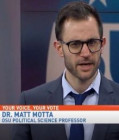How Interest in Science Boosts Trust in Climate Scientists
Americans’ attitudes toward scientists have become more negative in recent years, especially on the political right. Climate scientists specifically are amongst some of the least trusted scientific experts in the U.S. While most Americans think that climate scientists should have a say in shaping climate policy, many are skeptical of their motives and question whether their research is shaped by sound science.
Skepticism from part of the public has important policy consequences. People who hold negative attitudes toward scientists are more likely to support political candidates who are skeptical of the role that science plays in the policymaking process. They are also more likely to reject scholarly consensus on policy-relevant science about matters such as climate change and nuclear energy. In the climate area specifically, people who distrust climate scientists may be more likely to reject expert-backed policy recommendations of measures to slow rising global temperatures and cope with atypical weather patterns.
Given all of these realities, scientists care a lot about whether or not the public trusts them and their research – and many in the scientific community think they can boost trust through communication, by better informing the public about basic scientific facts. But recent research, has called into question whether or not this focus is likely to improve public opinion toward science and scientists. Maybe communicating facts is not enough. Indeed, my new research highlights the potential benefits of a different approach – focused on improving the public’s interest in science.
Why “Having All the Answers” is Not the Answer
The scientific community’s focus on increasing public knowledge is at least partially based on a “knowledge deficit model.” According to this model, distrust grows from the fact that many Americans lack basic knowledge about the fundamentals of science. Supposedly, people who comprehend scientific findings should be more likely to hold positive attitudes about scientific research and those who produce it.
But researchers have begun to question this model. A growing body of scholarship finds that, even though scientific knowledge is correlated with acceptance of science, the effects are conditioned by Americans’ cultural and political allegiances. Indeed, it turns out – as Cultural Cognition Theory expects – that people who are the best informed about science are the ones who know how to interpret scientific findings to fit with their previously-held beliefs. For example, scholars have found that political conservatives who know more about the basics of science are more likely to reject scientific consensus on politically contentious issues like climate change, compared to those with less scientific knowledge.
The Impact of Scientific Interest
If more knowledge does not necessarily lead to a higher likelihood of accepting scientific consensus, what else might? Scholars have recently discovered that people who are more interested in science tend to engage with scientific information in a more open-minded way, irrespective of their ideological commitments. But few researchers have so far looked specifically at whether interest boosts trust in climate scientists, and fewer still have investigated the impact of interest in science starting in young adulthood (a critical period in the development of attitudes about science).
To begin to fill this void, I did a recent study to test whether Americans’ interest in scientific issues in young adulthood is associated with increased trust in climate scientists later on in adult life. “Climate scientists,” in this study, include science professors, state environmental organizations, the United Nations Intergovernmental Panel on Climate Change, and U.S. researchers at the National Aeronautics and Space Administration and the National Oceanic and Atmospheric Administration. Here’s what I found:
- Long-term effects: Using nationally representative longitudinal data (surveys that interview the same people many times), I find that people who are highly interested in science in ages 12 to 14 are more likely to trust climate scientists nearly twenty years later (around age 35). Interest measured in adulthood has similar effects.
- Bi-partisan effects: Critically, I find that scientific interest in adolescence and young adulthood boosts trust in climate scientists irrespective of Americans’ ideological commitments. Liberals, moderates, and conservatives alike are all more likely to trust climate scientists if they become highly interested in science at young ages.
- Conditional effects of scientific comprehension: In line with recent critiques of the knowledge deficit model, I find that young adults’ knowledge about basic scientific facts has ideologically polarizing effects. Factual knowledge measured in young adulthood does boost trust in climate scientists later on in life – but only for ideological liberals.
Making Interest Central to Science Communication
My research underscores the importance of stoking interest in science. Such interest not only encourages trust in climate scientists, but tends to do so across the partisan divide. Ultimately, improving trust could make Americans in general more willing to listen to scientific expertise.
This research also highlights the importance of getting young people interested in science – perhaps starting with board-games, videos, and alternative reality games. Current science communication efforts that stress spreading facts among adults may have to change. Of course, efforts to improve public knowledge are important in their own right. Science literacy may not reduce political contention on high-profile issues, but has been shown to be associated with increased acceptance of scientific consensus on less controversial matters. Nevertheless, even as they spread factual information, science communicators can and should be doing more to whet people’s appetite for science – especially among adolescents and young adults. Making science more interesting, especially to the young, could be the best way to boost American support for scientifically informed policymaking for years to come.
Read more in Matthew Motta “The Enduring Effect of Scientific Interest on Trust in Climate Scientists in the United States” Nature Climate Change, 1, (2018): 485-488; and Matthew Motta “The Dynamics and Political Implications of Anti-Intellectualism in the United States” American Politics Research, 46, no. 3, (2018): 465-498.
